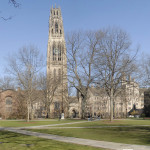“The impossible is the least that one can demand.” – James Baldwin
I have never felt more intellectually and spiritually affirmed than I have at the Asian American Studies Conference last month – an unprecedented event in Yale history. Over the course of the conference, I had the pleasure of listening to academics and graduate students delve into the aesthetics and politics of Asian American film and sonic production, the extraction of blood from indigenous Hawaiians as an extension of militaristic settler colonialism in the Pacific, Spam as a site of critical analysis (something crucial to my childhood), and the queer racial formations implied in the literary usage of washing socks as a metaphor for anal fisting – an outstanding array of research projects that demonstrated the depth of Asian American Studies as a crucial and necessary academic discipline.
For decades, members of the Asian American Studies Task Force have worked to translate our vision of a truly representative education into reality. Through the conference, we were able to successfully create conversations that actively combated the generative fable of whiteness – which operates on the consumption and reproduction of dominant narratives that only serve to erase students of color. It is easy to feel hopeless and exhausted in places that understand you as less than the entirety of your humanity, your history, your potential, your significance as a person who has and continues to survive even when you have been marked as a target of violence on the basis of existing. To use a quote from a presentation I heard on the intersections between #blacklivesmatter and Asian American female visuality, “have we ever had bodies other than the ones you constructed?”
The University has acknowledged demands from student activists for an Asian American Studies program at Yale since the 70s, but to the most limited, tokenizing extent with the renewed availability of a single survey course on Asian American history. President Salovey himself gave a speech at the reception that culminated with oh-my-how-far-we’ve-come musings on the supposed strength and notability of Yale’s (have I mentioned – nonexistent?) Asian American Studies program – an underwhelming experience for several present. From this it was made apparent that although there has been only one Asian American Studies course regularly offered at Yale – taught by the only professor in all of Yale faculty who specializes in Asian American Studies, it is in Salovey’s opinion that this meager display is demonstrative of quote-end-quote fulfilled promises. Vijay Iyer – jazz pianist, Yale alum, and a panelist at the conference – describes this phenomenon aptly in his presentation on ‘performing while brown in 2015,’ remarking that “the trope of the only brown person in the room is the presence that neutralizes white guilt by signaling at diversity while exhibiting zero allegiance to or investment in social justice.” To address the trauma inherent in having to fight for access to your own stories would be to concede to something terribly wrong with Yale’s claim to being wholly representative in its breadth of available programs of study.
If Yale is truly committed to a liberal arts education through which students can “think and learn across disciplines, literally liberating or freeing the mind to its fullest potential” as they so emphatically declare on their admissions website, then it’s past time that Oceanic and Asian American students are granted the opportunity to explore what we are rightfully entitled to: the legacies of resistance, community, and artistic creation that we have generated as folks whose pain has been and continues to be systematically made invisible by the United States – despite ongoing issues of exploitation, criminal neglect, sexual violence, and militaristic imperialism.
To every student who has had to bear distorted or absent representations of themselves in educational spaces: it has become increasingly evident to me that our collective process of self-determination cannot be complete without being able to access and understand one’s inheritance. For me, that would entail the struggle and the beauty that is being an Asian woman navigating, transcending, and challenging a white man’s world in a plethora of ways – such can be critically explored through the sheer richness, complexity, and enduring legacy of Asian and Pacific American presence. Inheritance is beyond recognition: it is the means by which we gain access to a heritage of challenging subjugation, to a past laden with contradictions. It is also how we begin to understand a future of accountability, for it is precisely in these spaces that uphold marginalized narratives as worthy of discussion, thought, time, and inquiry that we can also identify the ways in which our successes have been made possible by dehumanizing others.
Alongside fragmented histories of struggling for justice in opposition to war, exclusion, and occupation; artistic and literary achievements; distinct cultures forged from our sociopolitical and economic positioning in the US today – our complicity in preserving white supremacy is an element of our inheritance that we must acknowledge exists and continually fight. It is also for this reason that we must have Asian American Studies: it is not only an intellectually and emotionally validating field of study for many students of color, but it also provides an avenue through which folks can learn what it means to take up space at the expense of others, as well as how to build coalitions more inclusively. After all, Asian American Studies, African American Studies, Chicano Studies, and Native American Studies are intimately united with one another in their movements for integration into college curriculums – resisting white, cisgender, heteropatriarchal narratives of liberation and how they, as Iyer puts it, “enable whiteness to speak for us without listening to us.”
Even though the conference has long come to a close, Asian and Oceanic peoples at Yale resisted those narratives and upheld our own – I am moved, humbled, and still interrogating the ways in which we can appreciate and continue to fight for our recognition in critical studies, while dismantling cultural legitimation of experience through academia, which excludes those who are most marginalized within our own communities and beyond. Above all, I am inspired by everyone on the Task Force who worked tirelessly to make it possible: it is a testament to the inimitable desire of students to break the oppressive logic of silence together. It was impossible to attend the conference and not feel overwhelmed by hope. I am confident that a day in the future will come when we finally win this fight for our inheritance.
by Yuni Chang


